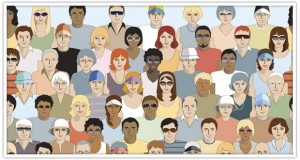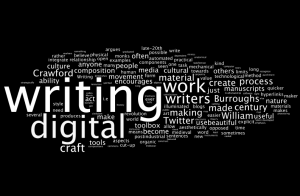Children today are born into a world of tablets, computers, and cell phones that allow for them to see the whole world just by sitting in the comfort of their own bed. A world where technology is constantly improving, providing them with even more opportunities to expand their knowledge and views. The digital world is growing rapidly and unrolling itself quickly in the academic world. Elementary, middle, and high schools are beginning to provide children with their own tablets or computers, either in school or even at home, so that the virtual connection that they were born into is something that they can utilize. This is important because communities, workforces, and most people use digital writing regularly to industrialize their businesses or ideas, and this next generation must know how to become a part of this major change.
What is digital writing specifically? Digital writing is found in many forms, such as small blogs posted by the author herself, a blog posted by a major corporation, or small posts on social media such as Twitter, Facebook, or Instagram. The digital age has come and is continuing to arrive so why not take advantage of the benefits it has to offer?

http://www.dospeedtest.com/blog/internet-revolution-and-internet-usage-facts/
Since digital writing is seeping its way into our lives, we are learning new and unique ways to write. Forget about a pen and paper, focus on your fingers and the keypad in front of you. Is it difficult or effortless to write a seven-page essay just by hitting the tabs on a board? Obviously it takes practice to become good at typing, but are you getting your ideas across clearly? Or are you adding unnecessary words and phrases just because it’s easier to do so than to hand write each letter word for word? That’s half the argument. Writing digitally may seem useless to some and an easy way to waste space and save time but it can be, and is starting to be utilized by the next generation through blogs and social media platforms because of the wide range of capabilities it offers.
I’ve constantly read in various articles from people like Jeff Grabill and organizations like the National Writing Project (NWP) that this generation of children are writing more than any other have, or children today are writing more than ever seen in human history. Either way it’s stated, children are writing, and they’re writing a lot. Yet a lot of this writing isn’t considered “real” writing because majority of it comes from online social media platforms. In his article “Why Digital Writing Matters in Education”, Grabill argues that “digital writing challenges what counts as writing and reveals the gap between how writing works in the world and how we teach it in schools”. To break this down we first have to ask, what actually does count as writing? That easily is an opinion up for debate, but in this case Grabill is referring to what counts as academically written pieces such as research assignments, analytical arguments, and basically anything perceived as written in school.

https://www.writersonlineworkshops.com/courses/12-weeks-to-a-first-draft
The second thing we have to look at is how digital writing is challenging this notion because much of it is not in five paragraph essay format and not automatically seen as high quality pieces of writing. Much of what digital writing is, is an idea on a topic written either carelessly or rather well, and Grabill’s argument is that it can be considered high quality writing if we learn to teach it properly in schools. Teachers need to be engaged with the environments online. So sending a teacher onto WordPress or twitter with the intention of looking for well written pieces of work could easily help expand views on digital writing.
Grabill’s second argument is “digital writing platforms and services are ways to innovate instruction and learning”. This is where the benefits of digital platforms make their appearance. Networks are created from digital writing. Grabill applies Wikipedia as an excellent example of how networks work. Wikipedia wouldn’t be full of as much ample information without the constant editing and rearranging of information from others. The same argument can be made for blog posts and Facebook posts. Without the help of others much of what is written on the internet can just be left unread, but with comment sections and the capability to view anything, people are able to gather tips and helpful information to make their pieces more unique, more interesting, and more important.
The audience is very important when writing online. One of the biggest challenges according to Jen Rajchel in her article “Consider the Audience” is “reaching out across multiple audiences with varied interests and deciphering which platforms are best suited to one’s content”. Audience is both a rewarding part of digital writing and one of its major drawbacks. To reach and connect to multiple audiences is difficult but a skill that should be grasped by students in the academic field because their writing will be seen by all types of people. In order to find the audience, you have to know what you’re writing about and manipulate words and phrases to connect to them. For example, when writing online for a teacher you would not write carelessly as if you were texting, instead you would use proper grammar and a sophisticated tone. But should you be writing to a younger audience, perhaps using slang would help put you on their level and them on your level.

http://www.swcreatives.com/swc-blog/knowing-your-nonprofit-organizations-audience
But once you have found your audience and they have found you, the benefits of online writing are immense. You can formulate conversations, get feedback, or even excel in a job. For example in Racjchel’s article she discusses how Hema Surendranathan changed her vocabulary from a normal subject line in an email to something that was “cool” and would make her stand out from dozens of other subject lines. By making herself stand out to her audience she could facilitate her goals.
So we have our teachers and we have our audience. How exactly can we make our online writing thoughtful and meaningful without just adding unnecessary information? In an article written by Todd Finley about the digital writer, Troy Hicks, we learn five important ways to help understand author’s writing goals. Mode (genre), media, audience, purpose, situation.
You first have to find your genre and understand what you are writing about. What is your exact subject, don’t stray from your subject? What media are you using? A blog on WordPress or a post on Facebook? Find your platform and don’t misuse it. Thirdly, know your audience. As stated before the audience is key when writing online because that is how you will appeal to at least one small piece of an immense world on the internet. Then find the purpose. The purpose is why you are writing. Why you want your work to be read. And finally, the situation. Is it graded or is it simply for your pleasure? Don’t focus too much on one of these but focus on what you want the essay to be read like. Once you find the set ways and rules for yourself when writing digitally it can positively be read and portrayed by the respective audience and respective situation.
The National Writing Projects says that “Digital writing is more than just a skill it is a means of interfacing with ideas and the world” as well as, “digital writing can help students develop critical thinking skills and support learning across all subject areas”. But why and how? Digital writing is going beyond just the regular pen and paper school setting, it is allowing for Racjchel’s and Grabill’s ideas to be combined. If properly taught in schools’ kids could acknowledge their capabilities and harness the endlessness of the internet, then connect with the world through online platforms. They can write properly, meet their audience, and do something meaningful with all of these ideas.

http://digitalwritingsu13.wikidot.com/
Digital writing can offer us a wide variety of uses. Although I haven’t been at Dickinson College for that long of a time, I do believe utilizing digital writing is going to be very important to me. In middle school we were told to create “Facebook posts” for famous people from the 17th century. They weren’t real, but it was the first interaction I had come across with digital writing in school, and we all giggled when we got the assignment because it seemed silly to be making a fake social media page for people who weren’t even alive. I understand now that it was important to know what people were saying, because that’s what digital media is sometimes, a place where people can say more than just what was verbally remembered.
Three years later, our high school began a digital program where they provided us with our own computers to use in school and outside of school. Through this we began using more social media platforms such as twitter and small blog websites to do projects, typing more essays and passing them in online, and connecting in the classroom differently than we ever had before. We could tweet at other students and our teachers, we could share writing pieces through email or google docs, and we could participate digitally rather than mechanically. I learned how to utilize a 140-character limit, write a well written piece of work for more than just the eyes of my teacher, and get help from fellow students online. As Pete Rorabaugh said in his article “Organic Writing and Digital Media: Seeds and Organs”, “Students post thesis statements to a twitter hashtag and reply to their peers’ work, or we have a more extended discussion through a forum”. Basically what Rorabaugh described is what we began to utilize in school. We could help each other and grow our ideas with the help of others. I know that when my school provided us with our computers we were able to harness the powers of digital writing and the internet.

Manny Crisostomo
http://www.edweek.org/tsb/articles/2011/04/04/02digital.h04.html
Not only did I learn how to write online through this, I believe I was better prepared for college because of it. Writing college applications is now a virtual concept, emailing teachers is a major form of communication, and writing and reading online pieces of work is an everyday occurrence for a class. I felt I was prepared to go to college with previous experience with digital writing, but I also felt it would be important to learn more. That is why I took a digital writing class. I needed to prepare myself for more than just college. Many jobs want their applicants to be able to harness the internet as a tool to expand business through social media. A digital writing class, I thought, would help further my experience with writing online. I don’t know what I want to major in, and probably won’t know for a while, but I think that by taking a course like this one I can help myself for when I do figure that out.
For instance, since I’ve grown up with social media and writing online I know how important it is to make sure I check everything I write or post because it stays online forever. I learned that in high school when they gave us our computers and provided us examples of how the internet can ruin lives. From my digital writing class now I’ve learned what goes into creating a visually pleasing piece of online writing, how to stay connected with an extremely large audience, and how to make myself stand out from the crowd to make myself heard. We created blogs in class and my blog was going to be a simple blog about interviewing people on campus. Then, since I’ve been in the class, I realized that that is not enough. So I created a blog about two things that are interesting, the people on campus and delicious food. I make sure to stay on point, focus on my target audience (college students), and I write well online without sounding too casual. Digital writing is beneficial to students in a surprising number of ways, it just needs to be utilized properly in the educational system.
So let us first learn as best as we can about digital writing and harness its power to our advantage in an age that is rapidly expanding as a digital world.

http://crei.com.br/noticia/internet-e-redes-sociais
Works Cited
Finley, Todd. “Troy Hicks: A Conversation About Digital Writing.” RSS. George Lucas Educational Foundation, 26 July 2013. Web. 04 Nov. 2016.
Grabill, Jeff. “Why Digital Writing Matters in Education.” RSS. George Lucas Educational Foundation, 11 June 2012. Web. 04 Nov. 2016.
“National Writing Project.” What Is Digital Writing and Why Does It Matter? National Writing Project, n.d. Web. 04 Nov. 2016.
Rajchel, Jen, “Consider the Audience,” in Web Writing: Why and How for Liberal Arts Teaching and Learning, ed. Jack Dougherty and Tennyson O’Donnell (University of Michigan Press/Trinity College ePress edition, 2014), http://epress.trincoll.edu/webwriting/chapter/rajchel.
Rorabaugh, Pete. “Organic Writing and Digital Media: Seeds and Organs – Hybrid Pedagogy.”Hybrid Pedagogy. Digital Pedagogy, 21 June 2012. Web. 04 Nov. 2016.
